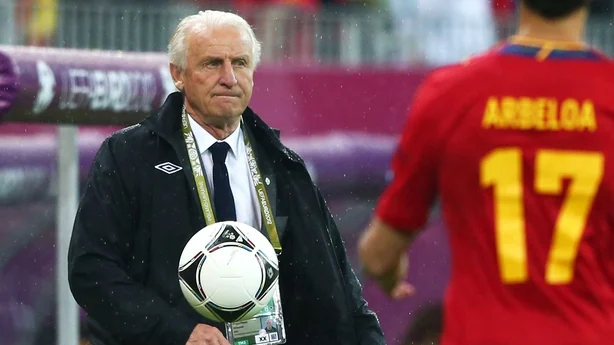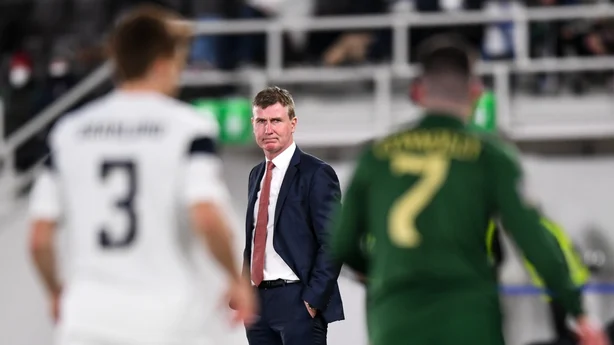The Republic of Ireland qualified for consecutive tournaments at Euro 2012 and 2016, which might suggest that it was a golden era for the game in the country; however, it was midway between the two that Ireland sank to their lowest ever position since the FIFA rankings began in 1992.
Remarkably, Ireland were ranked sixth on the list in that very first edition in 1992, coming off the back of the actual golden era, when narrowly missing out in a place in the Euro 88 semi-finals, and reaching the quarter-finals of Italia 90.
In fact, Ireland comfortably remained inside the top 15 until the end of qualification for Euro 96, when they lost a play-off to the Netherlands at Anfield.
That game signalled the end of the Jack Charlton era and it could be said that the health of the game – in FIFA terms at least – has never been the same since. Likewise, it had never seen such spotlight before the genial Geordie came to town in 1986.
Three years later, Ireland were back outside the top 50 having missed out on the 1998 World Cup, however, the run to Japan and Korea saw Mick McCarthy's charges continually rise up to 13th.
But without tournament football for the following decade, the nation again dropped out of the top 50 and were rarely higher than 30th until qualification for Poland and Ukraine brought them back on the European radar.
In 2012, Ireland had a management team that would not look out of place at any top club or country in the world as decorated player and manager Giovanni Trapattoni and former World Cup winner Marco Tardelli were employed.
No player in the Ireland squad came close to the profile that they possessed as the management team's wages were part funded by businessman Denis O’Brien.
Trapattoni signed a new contract ahead of Euro 2012, however, that tournament shone a light on Ireland’s inability to really compete at the top level of European football.

A tough group, of course, but Ireland were outplayed by Croatia and Spain, and were already out of contention for the knockouts before they played their final group game against Italy.
And that game in particular highlighted one of the main issues with Irish football – everything was about the here and now with no real focus on the future.
The manager had a chance to make wholesale changes to the team for that dead rubber and hand several squad members some vital tournament experience, however, Trapattoni stuck with virtually the same side for the game against his own country.
It marked the beginning of the end of Trapattoni, as Germany came to Dublin four months later and hammered Ireland 6-1 in the 2014 World Cup qualifying campaign – the manager was gone before the final games were played.
By June 2014, Ireland sank to their lowest ever position, 70th, in the FIFA rankings, and ten years on – despite qualifying for Euro 2016 – the national team are in danger of revisiting that nadir, having plummeted to 60th during the summer.
Granted, the FIFA rankings are not the definitive when it comes to the footballing health of a nation, and they were manipulated by countries like Romania before the Nations League as teams would move up the rankings by remaining idle.
The Nations League was introduced to banish the meaningless friendly from international football and four years in, the initial scepticism has passed and the tiered system has worked well, offering competitive action for teams against similarly ranked sides.
The overall winners of the competition do not really gain adulation, however, it has certainly served well in terms of freeing up play-off spaces and creating pathways to the major tournaments for the lower-ranked sides.

For Ireland, however, the Nations League has done nothing but highlight the ongoing demise of the national team.
Covid and a change of manager offered amnesty for the inaugural competition, but things got dramatically worse over the intervening years.
Ireland did not win an international game in 2020, the beginning of the Stephen Kenny era – four draws and four defeats, with the play-off exit to Slovakia considered a draw as it was decided by penalties.
The following year, things did not get much better as they won two competitive games, away to Luxembourg and Azerbaijan in that ill-fated 2022 World Cup qualification campaign, which was already effectively over following earlier defeat to Serbia, Luxembourg, at home, and Portugal.
With the winter World Cup in 2022, another Nations League took place, and while the manager made a bold statement suggesting that Ireland could win their group, they subsequently lost their opening two games against Armenia and Ukraine, and eventually just avoided relegation.
That summer, it looked like Ireland and the Kenny era may have finally turned a corner as they shocked Scotland 3-0 at the Aviva before earning a creditable away draw with Ukraine, however, normal service resumed in September when they lost 2-1 at Hampden Park.
Kenny’s final campaign in charge came in 2023 in a year that summed up his tenure as Ireland manager, as they started with a serious performance at home to beaten World Cup finalists France, albeit a losing one.
But then the momentum was totally lost in the next game as they lost 2-1 in Athens, which heralded the end of another campaign before it had really begun, losing their opening two games once more.
Ireland’s absence from Euro 2024 resulted in four friendly games to start the current calendar year, and it took that long to appoint a permanent replacement following Kenny’s exit last November.
Heimir Hallgrimsson has come in and had no more than a handful of training sessions – and several team meetings – before his opening game on Saturday night.
Losing at home to Euro 2024 beaten finalists England was to be expected, but Hallgrimsson was targeting the Greece game to kick-start his tenure and help set Ireland on the road to recovery.
The Icelander has not had long to assimilate into the culture of Irish football, however, on the results front, he has already become part of the unwanted and unwelcome recent tradition of losing the opening two games of a campaign.
The double defeat has been a feature of Ireland’s last four campaigns, and they have now lost 11 of their last 14 competitive games, excluding the two wins against Gibraltar.
Hallgrimsson has two games in October to change the narrative, but in the meantime, the next release of the FIFA rankings are due on 19 September.
Disclaimer: The copyright of this article belongs to the original author. Reposting this article is solely for the purpose of information dissemination and does not constitute any investment advice. If there is any infringement, please contact us immediately. We will make corrections or deletions as necessary. Thank you.






